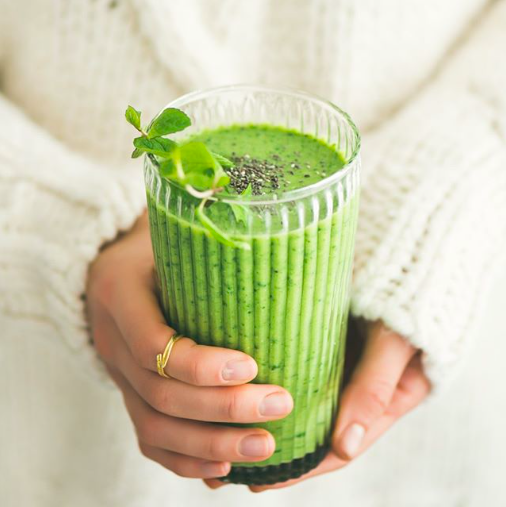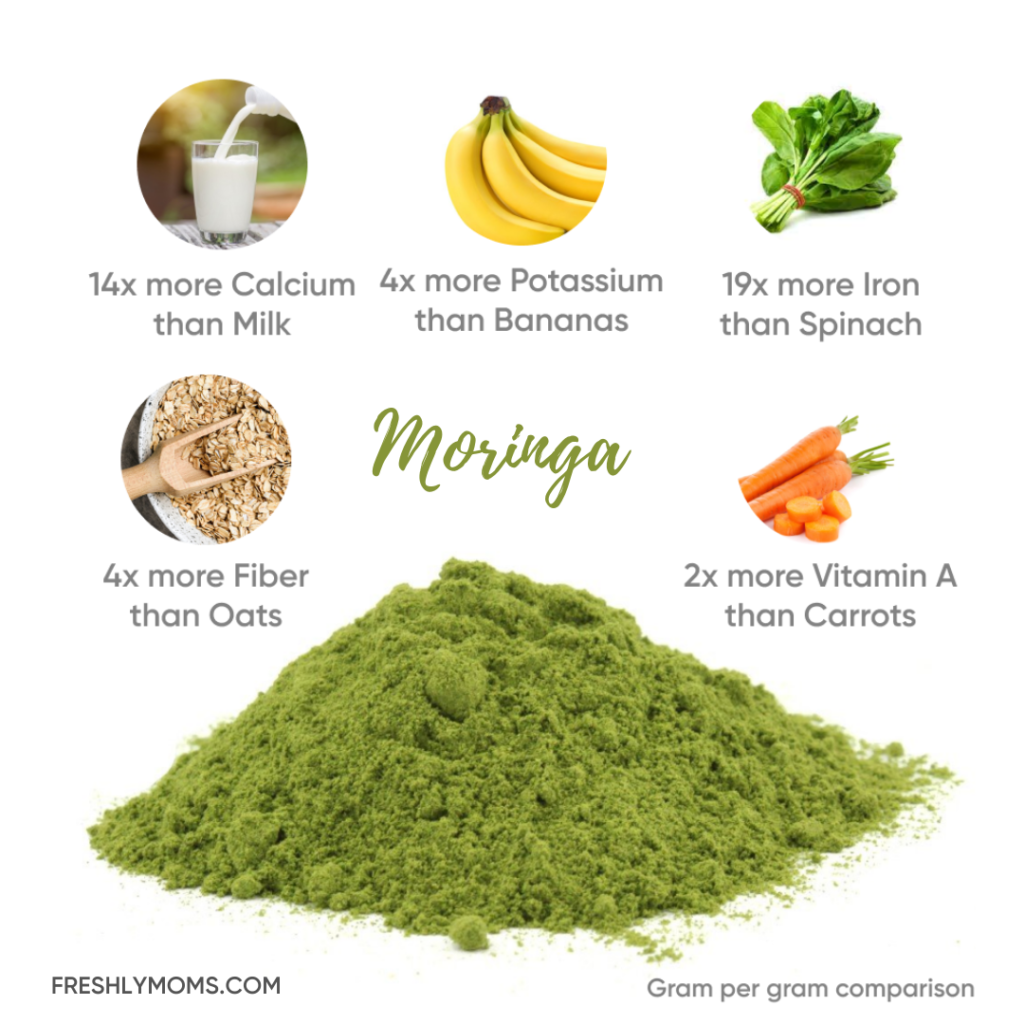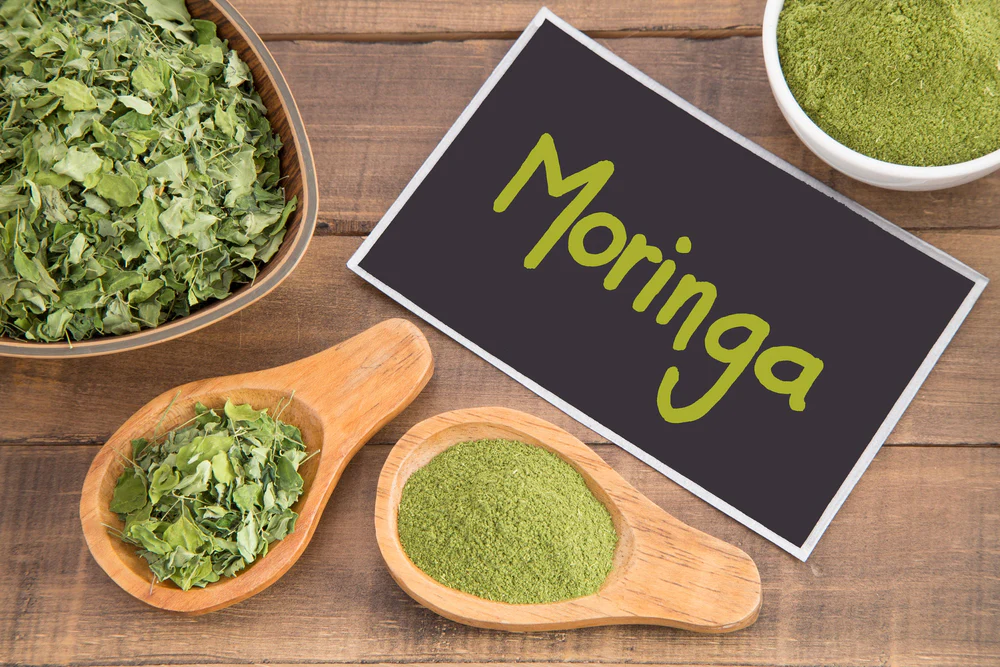In the journey towards optimal health, nature offers us a plethora of resources, each with its unique benefits. Among these, the Moringa Oleifera tree stands out for its remarkable nutritional profile and health benefits. Commonly known as the drumstick tree, Moringa has been used for centuries in various cultures for its medicinal properties. This article delves into the world of pure Moringa powder, exploring its benefits, how to incorporate it into your diet, and what to consider when selecting and storing it.
Table of Contents
The Moringa Tree: A Brief Overview
Nutritional Profile
- Vitamins: Moringa leaves are exceptionally high in several essential vitamins. They contain significant amounts of Vitamin A, which is crucial for maintaining healthy vision, immune function, and skin integrity. Vitamin C, abundant in Moringa, supports a healthy immune system and acts as a powerful antioxidant. Moringa also provides Vitamin E, which plays a critical role in protecting the body from oxidative stress and maintaining healthy skin and eyes.
- Minerals: The leaves are a rich source of many vital minerals. Calcium, essential for bone health and muscle function, is found in high amounts in Moringa, often more than what is found in milk. Iron, crucial for the formation of hemoglobin and oxygen transport in the blood, is also present in significant quantities, making Moringa an excellent supplement for preventing anemia. Potassium, important for nerve function and blood pressure regulation, and magnesium, involved in over 300 biochemical reactions in the body, are both plentiful in Moringa leaves.
- Protein: Moringa leaves are a rare plant-based source of all nine essential amino acids, making it an excellent protein source for vegetarians and vegans. Protein is vital for building and repairing tissues, making enzymes and hormones, and maintaining muscle strength.
- Antioxidants: Moringa is rich in antioxidants such as quercetin, which may lower blood pressure, and chlorogenic acid, which can help moderate blood sugar levels after meals. These antioxidants help combat oxidative stress linked to chronic diseases such as heart disease and type 2 diabetes.
- Fiber: The high fiber content in Moringa leaves aids in digestion and helps maintain a healthy gut. A diet rich in fiber can also help to prevent constipation, promote weight loss, and lower the risk of heart disease.

Historical Uses and Cultural Significance
Ancient Traditions and Medicinal Uses
In ancient times, the Moringa tree was known and revered in several cultures for its medicinal properties. Ayurvedic medicine, an ancient healthcare system of India that dates back over 3,000 years, has documented the use of Moringa in treating over 300 conditions. These include diabetes, heart disease, anemia, arthritis, liver disease, and respiratory, skin, and digestive disorders. The healing properties attributed to Moringa in Ayurvedic medicine highlight its significance in promoting health and well-being.
Similarly, in ancient Egypt, Moringa oil, derived from the seeds of the tree, was used for making perfumes and protecting the skin against the harsh desert climate. This practice illustrates not only the utility of Moringa in daily life but also its valued place in the cultural and social practices of the time.
Cultural Significance Across Continents
The use of Moringa has been recorded in various parts of Africa, where the tree is native. In many African cultures, Moringa leaves are used in cooking and traditional medicine. The tree is often planted near homes to easily harvest its leaves, pods, and seeds. This practice underlines the tree’s integral role in providing nutritional and medicinal support to communities, especially in regions where access to a variety of foods and medical supplies may be limited.
In the Philippines and other parts of Southeast Asia, Moringa leaves are commonly used in cooking, known for their ability to retain high levels of nutrients even when boiled. The cultural practice of using Moringa in daily meals underscores its importance in supporting nutrition and health in these communities.
Symbolism and Modern Significance
Beyond its practical uses, Moringa Oleifera holds symbolic meaning in some cultures. It is sometimes referred to as the “Miracle Tree” or “Tree of Life” because of its ability to thrive in challenging environments and its extensive benefits. This symbolism reflects the deep respect and appreciation for Moringa in societies aware of its life-sustaining properties.
Health Benefits of Moringa Powder
1. Nutrient-Rich Superfood: Moringa powder is densely packed with vital nutrients. It is a rich source of vitamins A, C, and E, calcium, potassium, and protein, offering a natural boost to the immune system and aiding in the maintenance of healthy bones, muscles, and skin.
2. Antioxidant Properties: Moringa powder contains a variety of antioxidants, such as quercetin, chlorogenic acid, and beta-carotene, which help combat oxidative stress and may reduce inflammation in the body. These antioxidants protect cells from damage, supporting overall health and potentially lowering the risk of chronic diseases such as heart disease and diabetes.
3. Supports Immune System: The high vitamin C content in Moringa powder strengthens the immune system, making the body more resilient against infections and illnesses. Additionally, its antibacterial and antifungal properties can help to fight off various pathogens.
4. Promotes Healthy Digestion: Rich in fiber, Moringa powder aids in healthy digestion by promoting regular bowel movements and contributing to a healthy gut microbiome. This can help alleviate digestion-related issues such as constipation and bloating.
5. Enhances Energy Levels: Moringa powder is known for its ability to boost energy levels naturally without the jitteriness associated with caffeine. Its high iron and magnesium content plays a crucial role in combating fatigue and improving energy metabolism.
6. Supports Blood Sugar Control: Several studies suggest that Moringa powder may have beneficial effects on blood sugar levels. Its chlorogenic acid content helps in moderating blood sugar levels post-meals, making it a potential supplement for people with diabetes or those at risk.
7. May Lower Blood Pressure: The isothiocyanates present in Moringa powder have been linked to blood pressure reduction. Managing blood pressure is vital for heart health, reducing the risk of heart disease and stroke.
8. Aids in Weight Management: The fiber content in Moringa powder can help in weight management by promoting a feeling of fullness, reducing cravings, and decreasing calorie intake. Its anti-inflammatory and diuretic properties also support weight loss and detoxification.
9. Enhances Skin Health: With its high vitamin A and E content, Moringa powder supports skin health by promoting collagen production, reducing fine lines and wrinkles, and offering protection against damage from the sun and pollution.
10. Improves Mood and Cognitive Function: Moringa powder has been shown to have mood-enhancing properties, potentially due to its antioxidant content and ability to support brain health. It may improve cognitive function, memory, and mood by reducing stress and anxiety.

How to Incorporate Moringa Powder into Your Diet
1. Smoothies and Juices: Adding a teaspoon of Moringa powder to your morning smoothie or juice is an excellent way to start your day with a nutrient boost. The powder pairs well with fruits like bananas, berries, and mangoes, masking its earthy taste and making your smoothie even more nutritious.
2. Teas and Beverages: Stir a half teaspoon of Moringa powder into a cup of hot water to make a soothing herbal tea. You can also add it to your favorite green tea or mix it into warm milk (dairy or plant-based) with a dash of honey for a comforting beverage.
3. Soups and Stews: Moringa powder can be easily incorporated into soups, stews, and broths. Its nutritional content is heat stable, making it a great addition to your cooking. Add a teaspoon or two into the pot while cooking to enrich your meals with vitamins, minerals, and antioxidants.
4. Salads and Dressings: Sprinkle Moringa powder over salads for an extra nutrient kick, or mix it into salad dressings. Combining Moringa powder with olive oil, vinegar, lemon juice, and herbs can create a healthy and flavorful dressing.
5. Baking: Moringa powder can be added to baked goods like bread, muffins, and pancakes. Substitute a small portion of the flour with Moringa powder in your recipes. This not only boosts the nutritional content but also adds a vibrant green hue to your baked treats.
6. Breakfast Cereals and Oatmeal: Stir Moringa powder into your breakfast cereal or oatmeal. Adding just a teaspoon can enrich your first meal of the day with essential nutrients without altering the taste significantly.
7. Energy Bars and Balls: For a quick, nutritious snack, mix Moringa powder into homemade energy bars or balls. Combine it with ingredients like nuts, seeds, dates, and oats to make a healthy snack that’s perfect for on-the-go energy.
8. Yogurt and Smoothie Bowls: Blend Moringa powder into your yogurt or smoothie bowls for an antioxidant-rich breakfast or snack. Top with fresh fruits, nuts, and seeds for added texture and nutrients.
9. Cooking: Moringa powder can be added to various dishes, including pasta sauces, curries, and vegetable sautés. It’s a simple way to boost the nutritional value of your meals without compromising on taste.
Selecting and Storing Pure Moringa Powder
Selecting Pure Moringa Powder
1. Look for Organic Certification: Choose Moringa powder that is certified organic. Organic certification ensures that the Moringa leaves have been grown without the use of synthetic pesticides and fertilizers, which can contaminate the powder and detract from its health benefits.
2. Check for Purity: High-quality Moringa powder should be pure, containing only 100% Moringa leaves. Avoid brands that add fillers or other ingredients which may dilute the potency and effectiveness of the powder.
3. Consider the Color: Pure Moringa powder should have a vibrant green color. A dull, brownish or yellowish color may indicate that the powder is old or has been improperly processed, leading to diminished nutritional value.
4. Verify the Processing Method: The best Moringa powder is made from leaves that have been shade-dried and cold-milled. This gentle processing method helps to preserve the delicate nutrients and enzymes in the leaves.
5. Read Reviews and Recommendations: Look for reviews and recommendations from other consumers and health professionals. Their experiences can help you identify reputable brands that offer high-quality Moringa powder.
Storing Moringa Powder
1. Keep it Sealed: Moringa powder should be stored in an airtight container to protect it from moisture and air, which can degrade its quality and nutritional content.
2. Store in a Cool, Dry Place: Exposure to heat and light can diminish the potency of Moringa powder. Store it in a cool, dark place, such as a pantry or cupboard, away from direct sunlight and heat sources.
3. Avoid Humidity: Moisture can lead to clumping and spoilage of the powder. Ensure the storage area is dry and the container is sealed tightly after each use.
4. Refrigeration is Optional: While not strictly necessary, storing Moringa powder in the refrigerator can help extend its shelf life, especially in warmer climates or if you plan to keep it for an extended period.
5. Monitor for Freshness: Regularly check your Moringa powder for signs of spoilage, such as changes in color, smell, or taste. Fresh Moringa powder should have a mild, earthy scent and flavor.

Source to Get Organic Moringa Leaf Powder Capsules
Conclusion
Moringa powder, derived from the leaves of the Moringa Oleifera tree, is a powerhouse of nutrients offering a wide range of health benefits. From boosting energy levels to enhancing skin health, its inclusion in your diet can significantly contribute to overall well-being. However, it’s essential to choose a pure product and consider any potential side effects.
FAQs
- What is Moringa powder good for? Moringa powder is good for boosting energy, supporting the immune system, aiding in weight management, and enhancing skin health.
- How often should I consume Moringa powder? It’s generally safe to consume Moringa powder daily, but start with small doses and listen to your body.
- Can Moringa powder help with weight loss? Yes, its high fiber content and low-fat profile can help promote a feeling of fullness and aid in weight management.
- Are there any side effects of consuming Moringa powder? While Moringa powder is safe for most people, it’s important to consume it in moderation and be aware of potential side effects, especially for those on medication or with specific health conditions.
- How should I store Moringa powder? Store Moringa powder in a cool, dry place, away from direct sunlight, to preserve its nutritional value.
